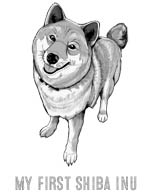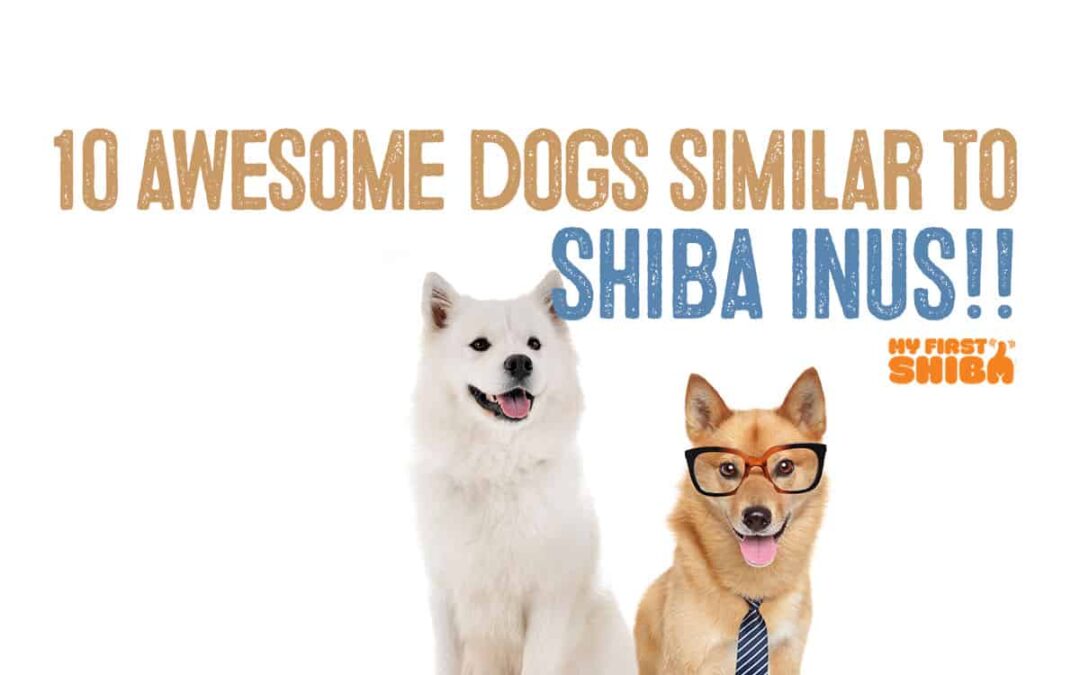On occasion, our posts contain affiliate links. However, we only recommend products that we truly believe in. For more information, visit my privacy policy page.
Many people love the fact that the Shiba Inu is unique and unmistakable. Shiba Inus dance, scream, and use their airplane ears to fly right into your heart.
Their personalities are strong, and they have high intelligence.
Yet, Shiba Inus aren’t perfect for everyone. Sometimes, you want a dog who is less aloof and more affectionate, or a dog with more or less energy.
Fortunately, there are many dog breeds out there that both look and behave like Shiba Inu. You are bound to find a breed that matches you to a T.
We looked at other Spitz breeds and Japanese breeds to find the dogs most similar to Shiba Inu. Without further ado, here are breeds similar to a Shiba Inu, either in appearance or personality:
10 Dog Breeds Similar To Shiba Inus
1. Finnish Spitz
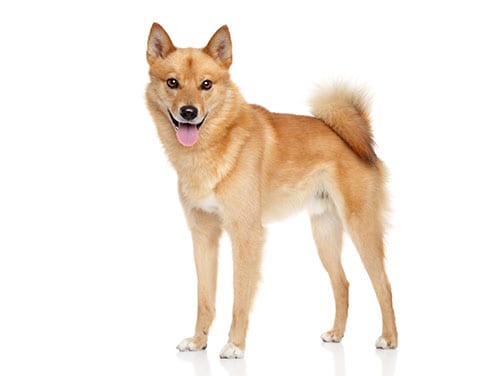
Looking for an excellent family dog that is vocally expressive like a Shiba Inu? Introducing the Finnish Spitz.
Although Shibes come from Japan and the Finnish Spitz from Finland, these two breeds are strikingly similar in both appearance and personality.
At 18-20 inches tall, Finnish Spitz stand a little higher than Shiba Inu and weigh between 28-33 pounds. Yet, they have perked, triangular ears, a curling plume tail, and reddish-colored coat.
Many people often confuse the Finnish Spitz for a "smaller" Shiba Inu.
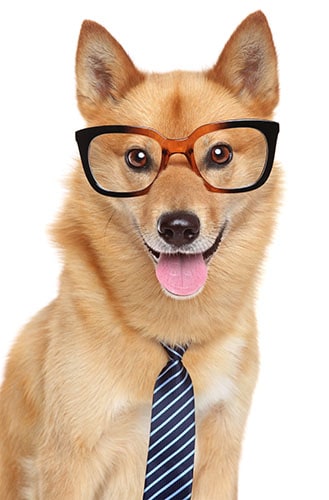
Fearless and bold, these vocal dogs are a beloved breed in Finland. They're also excellent guard dogs, as they are wary but not timid of strangers and are protective of their families.
You can also teach these intelligent dogs a range of commands, as well as agility and obstacle course tricks. If you are looking for a captivating companion, a "Finkie" could be for you.
2. Shikoku Inu
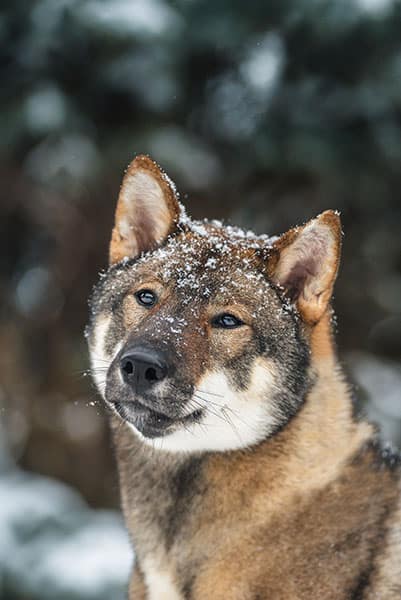
The Shikoku Inu was originally bred in Shikoku, Japan and is one of the six ancient Japanese breed of dogs.
They share many personality traits of the Shiba Inu and Akita.
These dogs have a slightly more aggressive personality, partially because of their incredible hunting instincts.
Friendly towards family who raise them from puppyhood, Shikoku dogs are protective and will require plenty of socialization to get used to seeing people outside their pack.
The Shikoku Inu is the in-between breed, in terms of size. They are larger than Shiba Inu but smaller than Akita, and they look very similar to both as well. Standard Shikoku Inu colors include sesame, tan, and black.
There is also cream, reddish-brown, and black-brown, though these are more rare. That said, all Shikoku Inu have white bellies, white around the snout, and curling tails.
This is an excellent breed for a small family without additional pets.
They want to reciprocate whatever love you give them, and they are also an intelligent and energetic companion. Shikoku Inu love walks, training sessions, and games.
3. Akita Inu
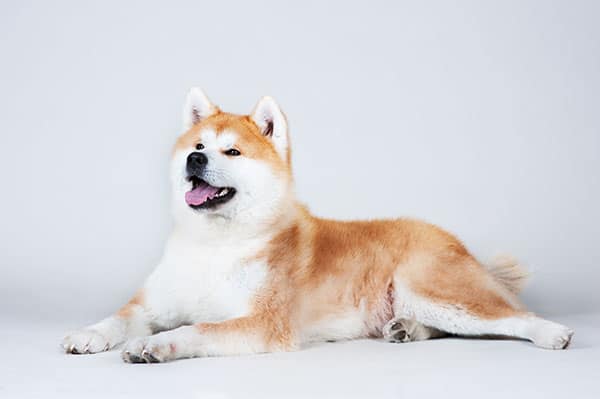
Much larger and brawnier than a Shiba Inu in size, the Akita Inu is a formidable hunter and fiercely loyal friend.
They are heavier set, and have denser coats than Shibas. Their coat colors include—red, fawn, brown brindle, black—as well as white or black markings.
Akitas are bit more quiet than Shibas, using their personalities and expressive eyes to do most of their talking.
While Akita dogs love human companionship, they tend to be less affectionate than the Shiba Inu or Finnish Spitz.
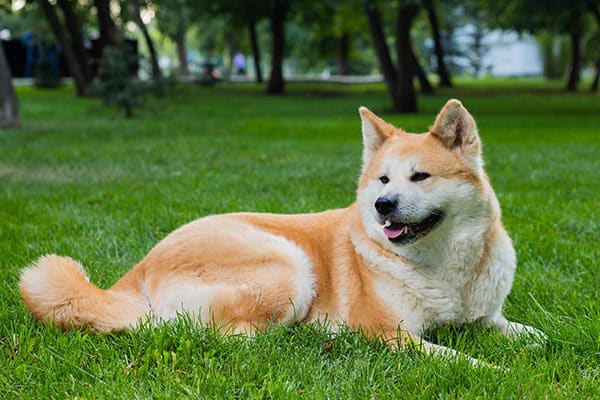
Yet, when an Akita loves you, you know it. With their most beloved people, Akita Inu are far less reserved and much more comical.
Akita Inu don’t require much exercise—a brisk walk is fine—but they do need stimulation, especially in a small home. Yet, they can adapt to all kinds of lifestyles and weather conditions.
Oh, and here’s a fun fact for you: Did you know that Akitas were used to hunt bears?
4. Korean Jindo
The Korean Jindo looks similar to a Shiba Inu in the face, though its body is longer, leaner, and larger.
This breed is native to an island off the coast of South Korea, much like the Shiba Inu is native to Japan. Jindo have a variety of coat colors, including black and tan, brindle, gray, white, and fawn, as well as markings that are similar to a Shiba Inu.
What separates a Jindo from a Shiba Inu is their personality. Yes, these dogs are extremely affectionate and intelligent, and they can be a guard dog, a hunting companion, or even a furry friend.
Their strong hunting instincts add to their alertness and bravery. Yet, these instincts also mean that the Jindo doesn’t like other animals much, including dogs, especially dogs of the same sex.
You probably can't have a Jindo in a multi-dog home and expect them to be happy.
They also require a lot of exercise. Like Shiba Inu, this breed is a fastidious cleaner. They love a pristine coat, and they spend a lot of time grooming. Even when they eat, they do it methodically and sparingly.
5. Hokkaido Inu
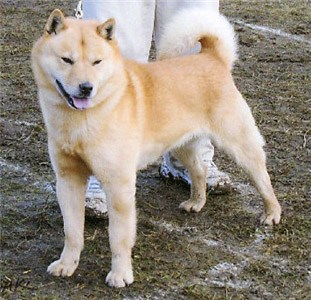
Raised in the cold landscape of Hokkaido, Japan, this dog breed is another one of the six native dogs of Japan.
For those who love hiking in the mountains and exploring elevated terrain, the Hokkaido dog is a wonderful companion.
They have an incredible sense of direction, powerful sense of smell, and are very protective of their own.
Similar to Shibes in both temperament and appearance, the Hokkaido Inu is quiet, save for when it detects prey. Then it races off, howling and barking at the top of its lungs.
Socialization is required for this breed, and you shouldn’t trust them alone with small animals or children, as their hunting instincts are very high.
Hokkaido Inu have dense undercoats, so they thrive in cold temperatures. Hot, humid environments are problematic.
Furthermore, they need plenty of outdoor space to run around. Apartment living can be difficult with this breed and not recommended.
Most native Japanese dog breeds aside from Shibas are rare and finding quality breeders is difficult.
6. American Klee Kai
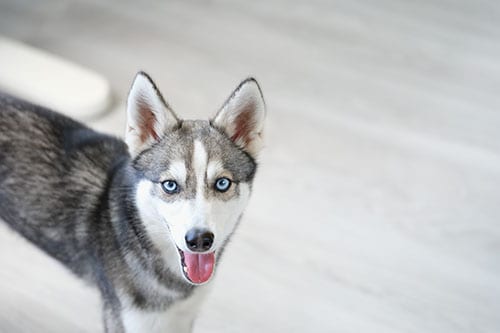
A lot of people say that huskies and Shiba Inu have a lot in common, but they forget about the Klee Kai (pronounced KLEE-ki), which literally means “small dog,” in Eskimo.
When the Klee Kai was first discovered by anyone outside of Eskimo communities, they first thought it was a miniature Alaskan Husky.
The Klee Kai comes in three sizes: toy (up to 13 inches tall), miniature (between 13-15 inches), and standard (15-17 inches).
Similar to Shiba Inu, the Klee Kai has a double coat that is blown twice a year. Klee Kai have the same colors for both eyes and coat as a Husky while having the same foxy expression of a Shiba Inu.
Klee Kai are not hyper like huskies, but they are high-energy and intelligent. They will talk back to you, but they don’t bark a lot. Nor are they as dramatic as Shiba Inu.
Looking for a dog breed that has jokes? The Klee Kai is for you. Because of their big brains, Klee Kai enjoy playing pranks on their owners.
If you want a small, affectionate, and active dog for your family, the Klee Kai is perfect. They love playing with other dogs and, if introduced young, can even live with cats.
7. Samoyed
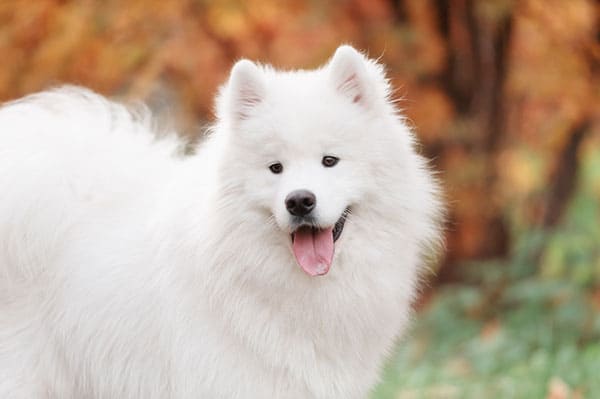
Larger than a Shiba Inu and close to an Eskie in appearance, the Samoyed is yet another breed that share some similarities with Shibas.
If you happen to love a medium or large breed of dog that is overly cute, the Samoyed might be for you!
Do you want the best qualities of a Shiba Inu—their affection, loyalty, and trust—built into one breed that actually likes snuggling? The Samoyed is a highly affectionate dog who will happily curl up beside you on the couch.
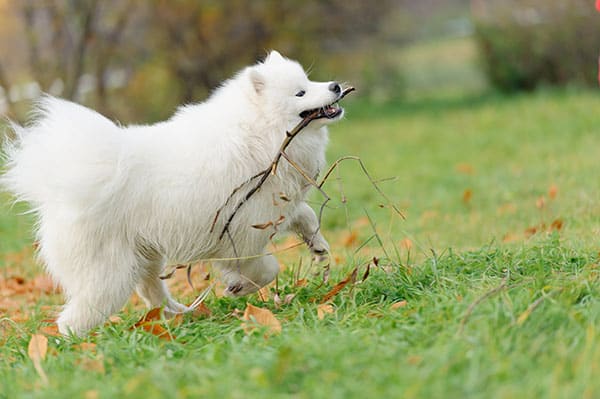
They are also fiercely loyal to their family, but unlike Shiba Inu, the Samoyed are much less timid around strangers. In fact, one of the running jokes about the Samoyed breed is that they are so trusting of strangers, they would help a burglar steal from your home. Shiba Inu, on the other hand will bark and protect.
Samoyed and Shiba Inu alike have high prey drives, require plenty of exercise, and need mental stimulation throughout the day.
While the Samoyed isn’t as intelligent or stubborn as a Shiba Inu, they will keep you on your toes and make you laugh with their antics.
8. Kishu Ken
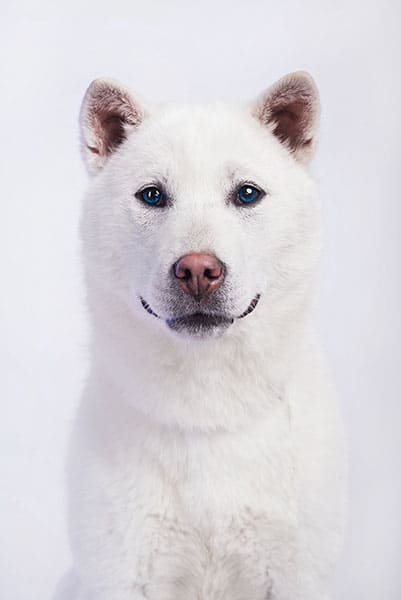
Another breed hailing from Japan, the Kishu Ken is closely related to both Shikoku Inu and Akita dogs.
Kishus stand between 17-19 inches tall and weigh between 30-60 pounds, depending on their gender. There are two main physical differences between Kishus and Shibas: Kishus have ears that slant or droop slightly forward, giving their ears a slightly wary look. Secondly, their tails don’t curl.
Kishu Ken are incredibly smart, and they like order around the home. Kishus are also calm and quiet. They tend to enjoy extended periods of activity, such as a long hike or walk, as opposed to sprints.
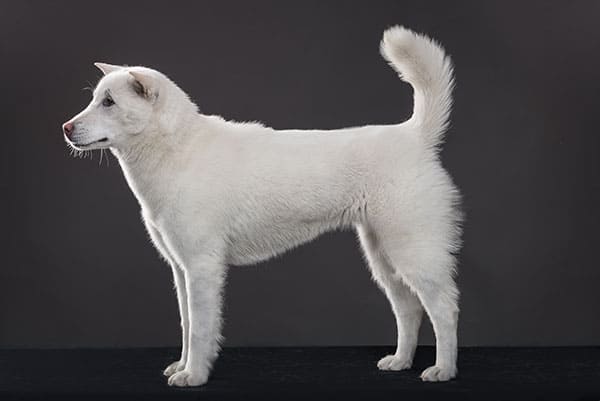
In many ways, the Kishu Ken behaves more like a cat than a Shiba Inu does. Because of this, they are not a breed for first-time dog owners.
Protective but also aloof, the Kishu Ken prefers work to play. They aren’t recommended for homes with multiple dogs or pets, as they tend to become aggressive and seek dominance. This is likely due to the fact that Kishus were used by the ancient Matagi tribes as fierce hunting dogs.
9. Eskimo Dog
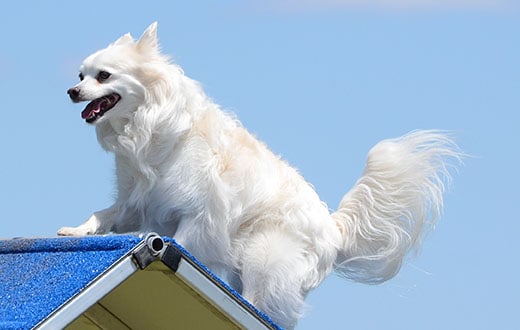
American Eskimo Dogs, also known as Eskies, are beautiful dogs with wonderful personalities.
You can tell an Eskie apart from a Shiba Inu easily, because Eskimo Dogs have thick, double-layered white coats (though some are called “biscuit cream”; deep, expressive eyes; and a very sweet expression.
They love receiving attention from their owners, especially in the form of brushing. And yes, you will have to groom your American Eskimo Dog quite often to keep them looking clean and healthy.
Have young children?
The American Eskimo dog is an ideal companion. Because they are so affectionate and loyal, you'll have less worries about leaving an Eskie with your children.
They are tolerant and patient; they will treat children like a best friend.
Plus, their energy levels are great for families that love couch time as much as they love a walk. Eskies just want to be by your side!
10. Kai Ken
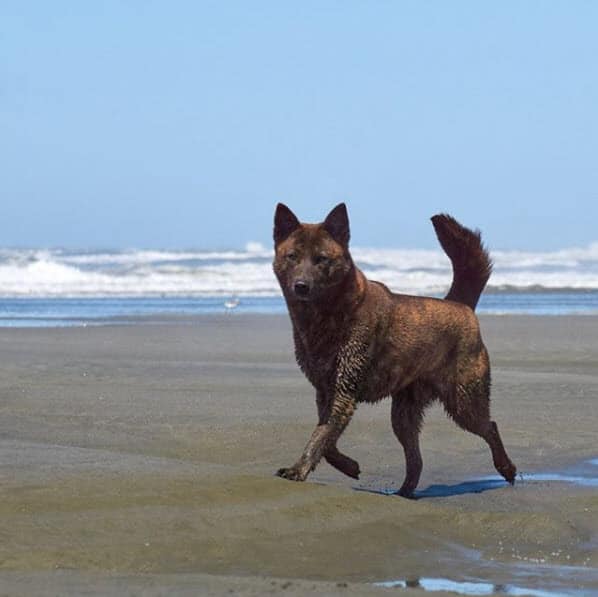
Considered very rare, even in Japan, its homeland, the Kai Ken is a unique dog. Their shape is very similar to a Shiba Inu, yet more sleek.
Kai Kan look agile and smart, with their short, erect tails, and wide eyes. Their brindle coats are short and beautiful.
Most puppies have pure black coats that develop the brindle stripes as they age, helping them camouflage themselves when hunting.
Kai Ken are fast-learners, much faster than a Shiba Inu, yet also more trusting, less aloof, and devoted to their families. In other words, they are much more lovey-dovey than a Shiba Inu.
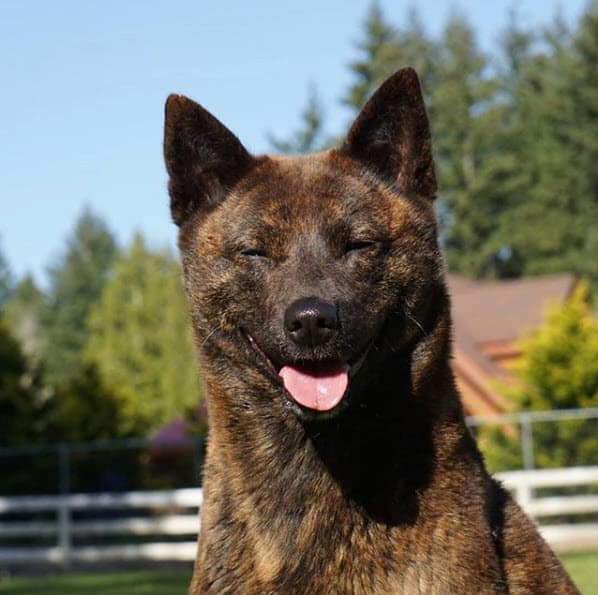
If you love parkour, the Kai Ken is your breed. These acrobatic dogs are known to climb and leap and swim in pursuit of their prey.
It’s not uncommon for Kai Ken to scrabble up trees. While this means they need daily exercise and mental stimulation, these dogs are also easy to train and will make perfect family members provided you can actually find one in your area!
Wrapping Up
There are many breeds that look and act like Shiba Inu, especially the breeds classified as Spitz.
If you are looking for dogs like Shiba Inu, look first for the close Japanese cousins, such as Akita and Shikoku Inu.
But if you want a similar personality, the Finnish Spitz, Eskimo Dog, and Samoyed will be wonderful companions for you.
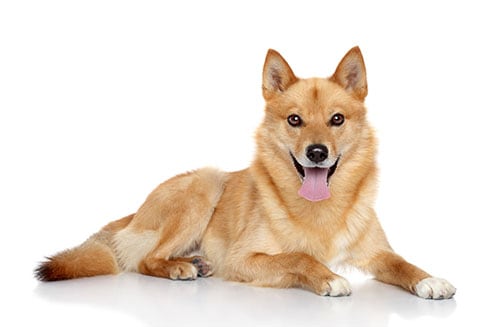
Keep in mind that any of these breeds listed have similar needs, such as daily walks, playtime, and mental stimulation.
Not every dog is as intelligent and independent as a Shiba Inu, but Spitz and Japanese breeds tend to be strong-willed, requiring an experienced dog owner.

Thanks for visiting Myfirstshiba.com! We do our very best in providing our readers with awesome content about our beloved Shiba Inu breed. Some of our articles include reviews and recommendations to our favorite products. We do occasionally earn commissions from certain affiliate links that help support our work and mission. Thanks again for visiting. Shiba Kisses To All!
